 I concluded last week's Supporting Actress Sunday profile with a meditation on "the accretive nomination" -- the nominations that sometimes emerge for a performer's accumulation of work in a particular year or phase of their career. It's the kind of thing that peeves some "awardies" (the award show equivalent of "foodies") to no end: "give the prize for the performance, not the career," they moan. Yet, the accretive nom is an undeniable part of award show tradition. And this week, 1955 might bring us yet another example -- a singer who gave both her most memorable screen performance as well as this one, the performance that earned a Supporting Actress nomination for...
I concluded last week's Supporting Actress Sunday profile with a meditation on "the accretive nomination" -- the nominations that sometimes emerge for a performer's accumulation of work in a particular year or phase of their career. It's the kind of thing that peeves some "awardies" (the award show equivalent of "foodies") to no end: "give the prize for the performance, not the career," they moan. Yet, the accretive nom is an undeniable part of award show tradition. And this week, 1955 might bring us yet another example -- a singer who gave both her most memorable screen performance as well as this one, the performance that earned a Supporting Actress nomination for...approximately 19 minutes and 4 seconds
11 scenes
roughly 20% of film's total running time
11 scenes
roughly 20% of film's total running time
Peggy Lee plays Rose Hopkins, the enigmatic companion of tough guy Fran McCarg.
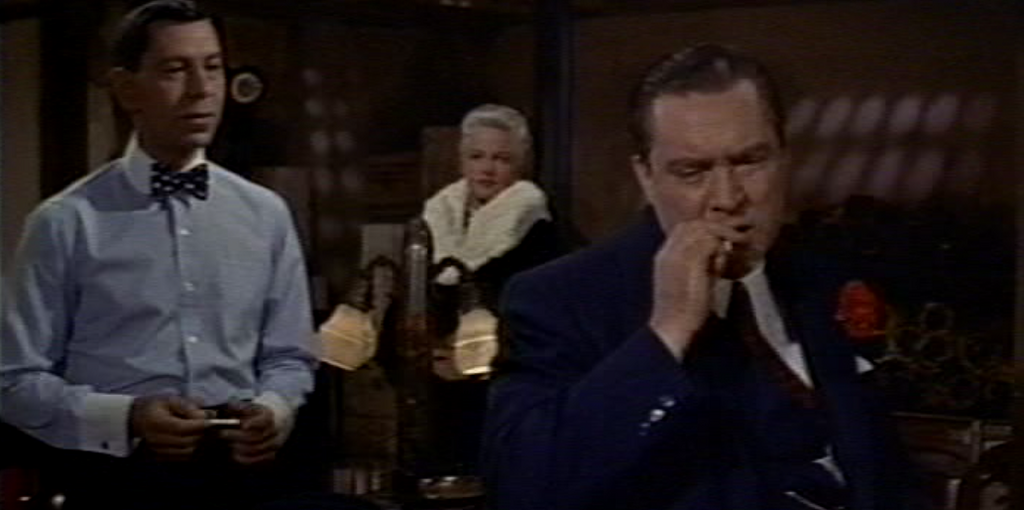 McCarg strong-arms Pete Kelly into making Rose the girl singer for his band, which does not endear Rose to Pete. Yet, when Pete Kelly sees the casual cruelty of McCarg's treatment of Rose, he takes a liking to her.
McCarg strong-arms Pete Kelly into making Rose the girl singer for his band, which does not endear Rose to Pete. Yet, when Pete Kelly sees the casual cruelty of McCarg's treatment of Rose, he takes a liking to her.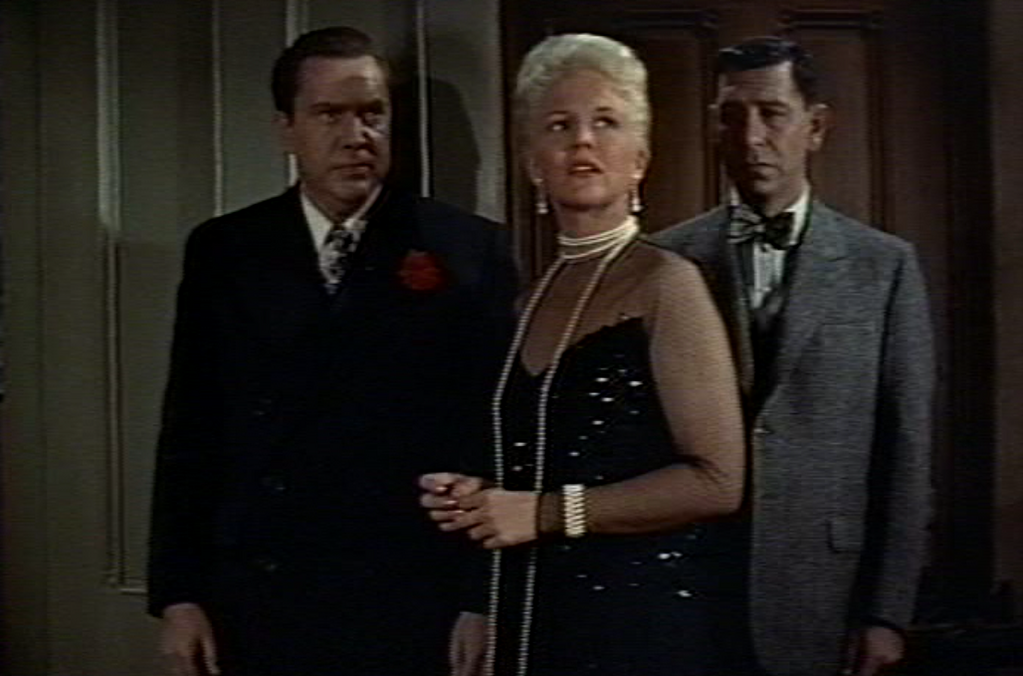 Rose blossoms in his presence, nourished by the courtesy and dignity he affords her.
Rose blossoms in his presence, nourished by the courtesy and dignity he affords her.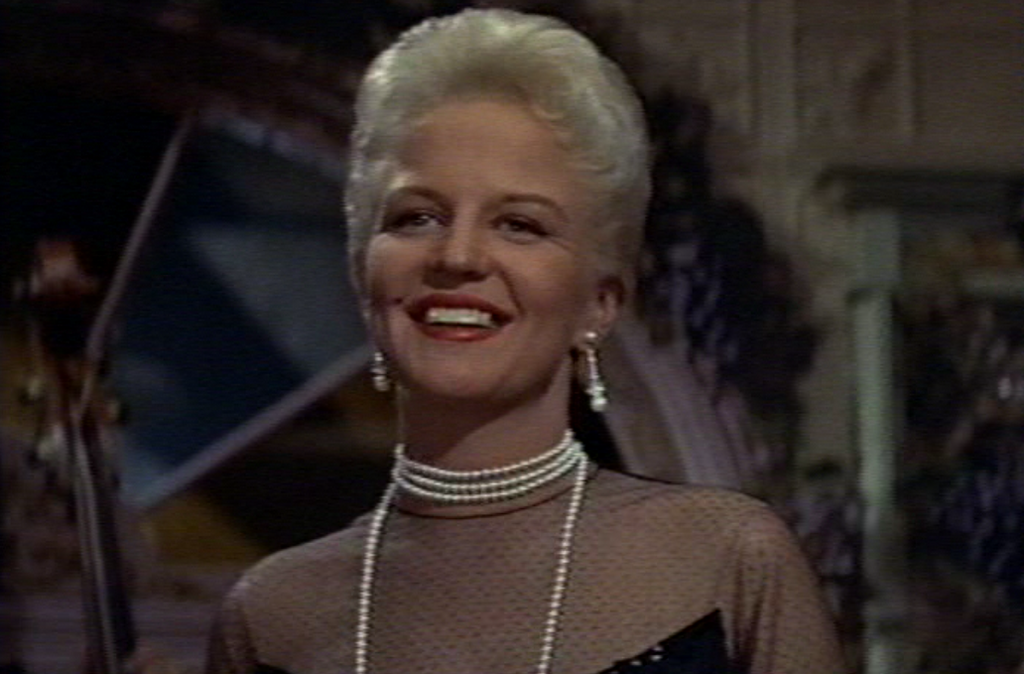 Pete and Rose also play well together, with Rose's talents as a singer quickly counterbalancing whatever burden her presence might have initially brought Pete's band.
Pete and Rose also play well together, with Rose's talents as a singer quickly counterbalancing whatever burden her presence might have initially brought Pete's band.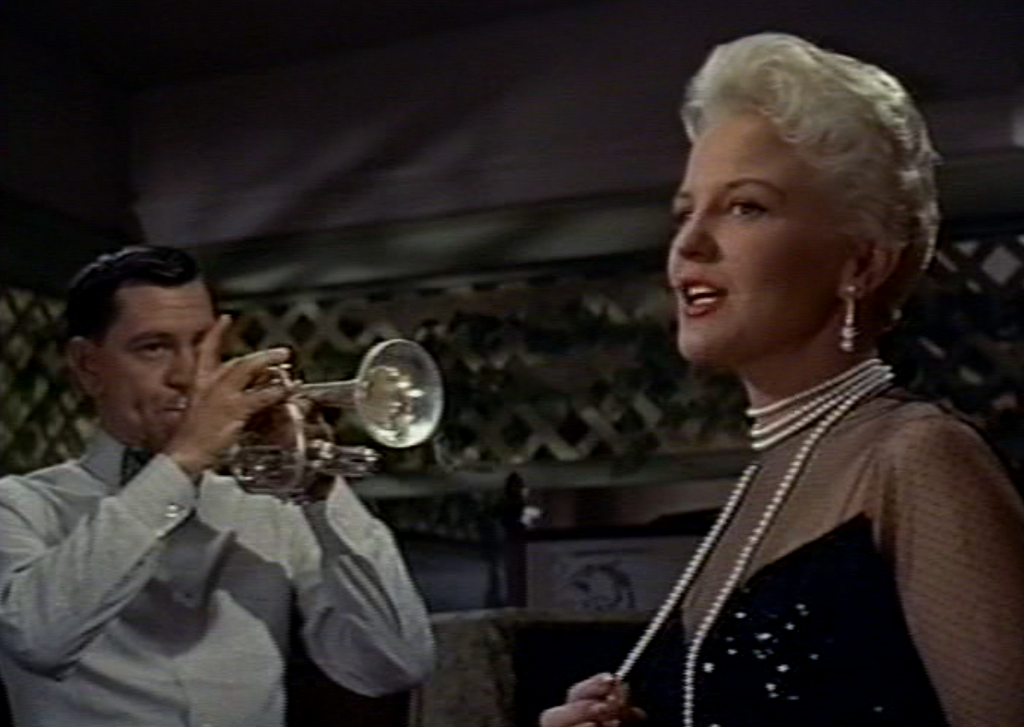 Yet there's a sadness that emanates from Rose, a mournful numbed anguish that's amplified by every drink she takes
Yet there's a sadness that emanates from Rose, a mournful numbed anguish that's amplified by every drink she takes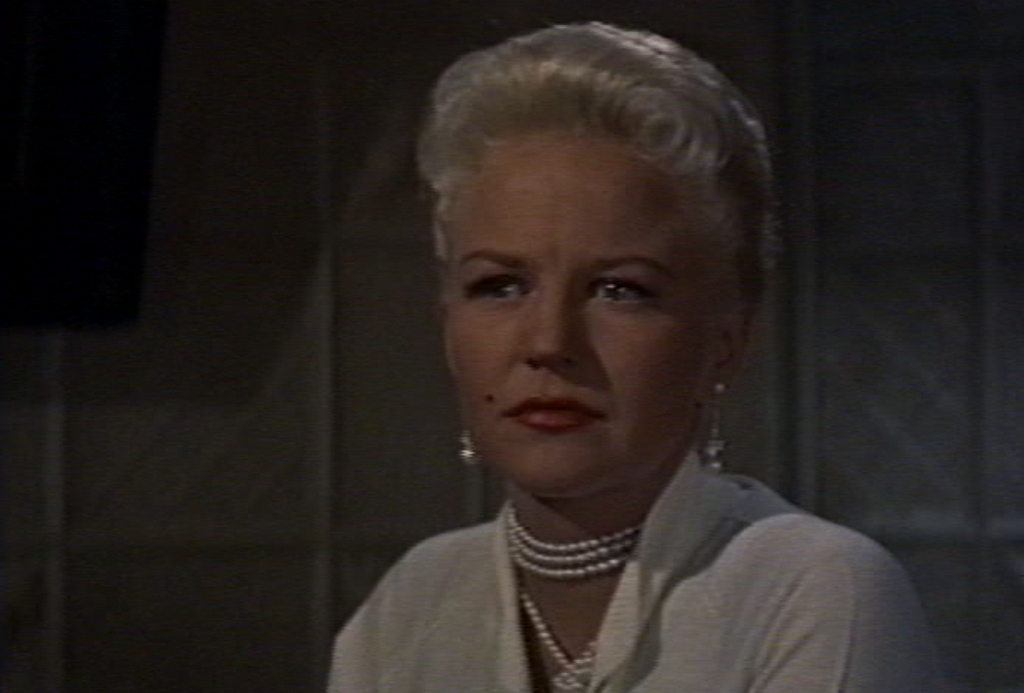 Peggy Lee's Rose is fascinating -- enigmatic and heartbreaking. Lee's singing is beyond gorgeous, and her distinctive presence imbues the character with the palpable thrall of mystery.
Peggy Lee's Rose is fascinating -- enigmatic and heartbreaking. Lee's singing is beyond gorgeous, and her distinctive presence imbues the character with the palpable thrall of mystery.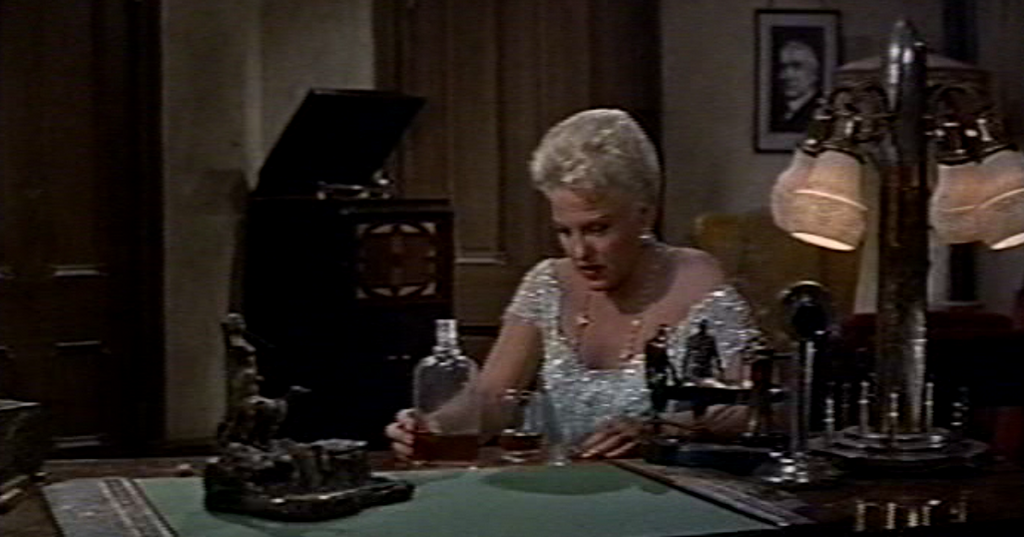 The problem comes when Lee's inexpertness as an actress combines with Jack Webb's flatfooted direction. Webb was a radio guy, newly arrived to the visual media of film and television when he directed this piece. In Pete Kelly's Blues, it seems he cast for voice -- with each of the principal characters having a precise and distinct vocal affect. The vocality and presence of each character is strong even as their visual and physical dimensions are awkward and stiff.
The problem comes when Lee's inexpertness as an actress combines with Jack Webb's flatfooted direction. Webb was a radio guy, newly arrived to the visual media of film and television when he directed this piece. In Pete Kelly's Blues, it seems he cast for voice -- with each of the principal characters having a precise and distinct vocal affect. The vocality and presence of each character is strong even as their visual and physical dimensions are awkward and stiff.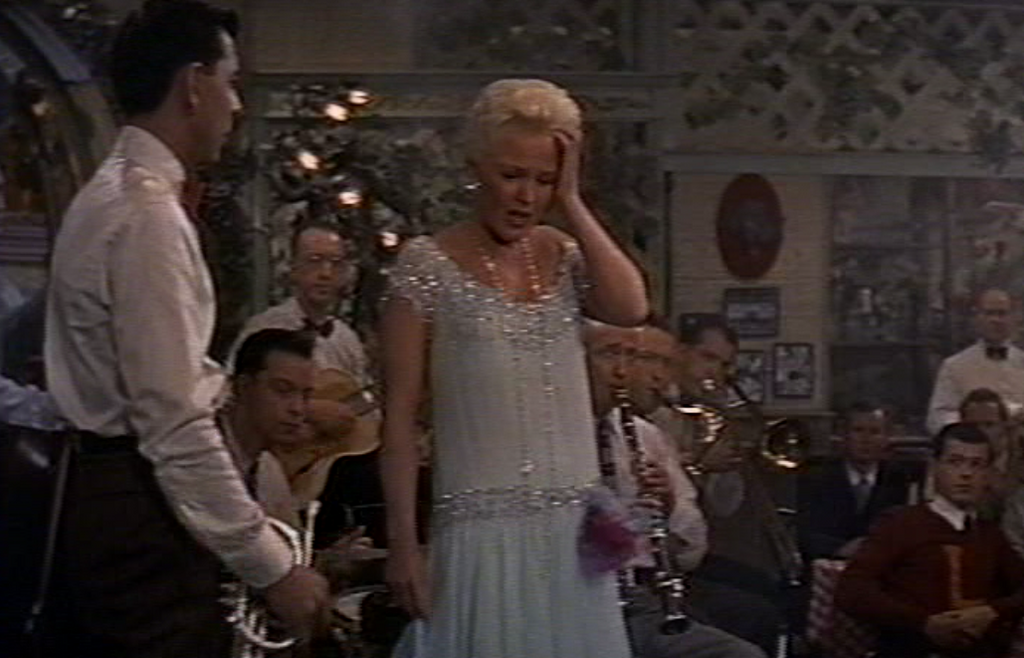 And it's in Peggy Lee's Rose that Webb's directorial deficits are most conspicuous. With Ella Fitzgerald, who's so painfully self-conscious in her scenes that it's clear Webb was working with a gifted performer possessed of little acting talent. But with Peggy Lee's Rose, it seems equally clear that, with Lee, the director had all the makings of a brilliant performance. Lee's line deliveries are apt, character-based and drenched with emotion. The singer's ethereal gifts as a monologist texture the phrasing of her every line. But, it seems, Lee has no idea how to share her performance with the camera. She hides from the camera, or stands tense before it. And what's worst: Webb apparently has no idea how to help. He directs Lee's performance as he did his own -- it's all herky jerky stiffness, with awkward freezes and amateurish, indicative gestures. On Lee, the director's clumsy handprint is everywhere it shouldn't be.
And it's in Peggy Lee's Rose that Webb's directorial deficits are most conspicuous. With Ella Fitzgerald, who's so painfully self-conscious in her scenes that it's clear Webb was working with a gifted performer possessed of little acting talent. But with Peggy Lee's Rose, it seems equally clear that, with Lee, the director had all the makings of a brilliant performance. Lee's line deliveries are apt, character-based and drenched with emotion. The singer's ethereal gifts as a monologist texture the phrasing of her every line. But, it seems, Lee has no idea how to share her performance with the camera. She hides from the camera, or stands tense before it. And what's worst: Webb apparently has no idea how to help. He directs Lee's performance as he did his own -- it's all herky jerky stiffness, with awkward freezes and amateurish, indicative gestures. On Lee, the director's clumsy handprint is everywhere it shouldn't be.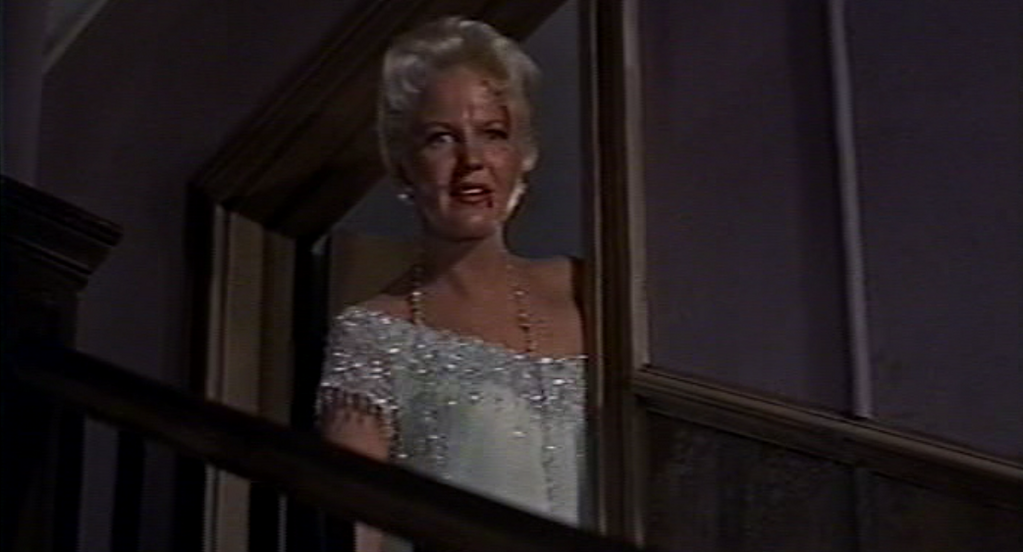 Yet, somehow, the "something" at the center of Peggy Lee's performance withstands the disastrous direction -- a fact that's made clear in the devastating, bizarre asylum scene that provides Rose's haunting coda.
Yet, somehow, the "something" at the center of Peggy Lee's performance withstands the disastrous direction -- a fact that's made clear in the devastating, bizarre asylum scene that provides Rose's haunting coda.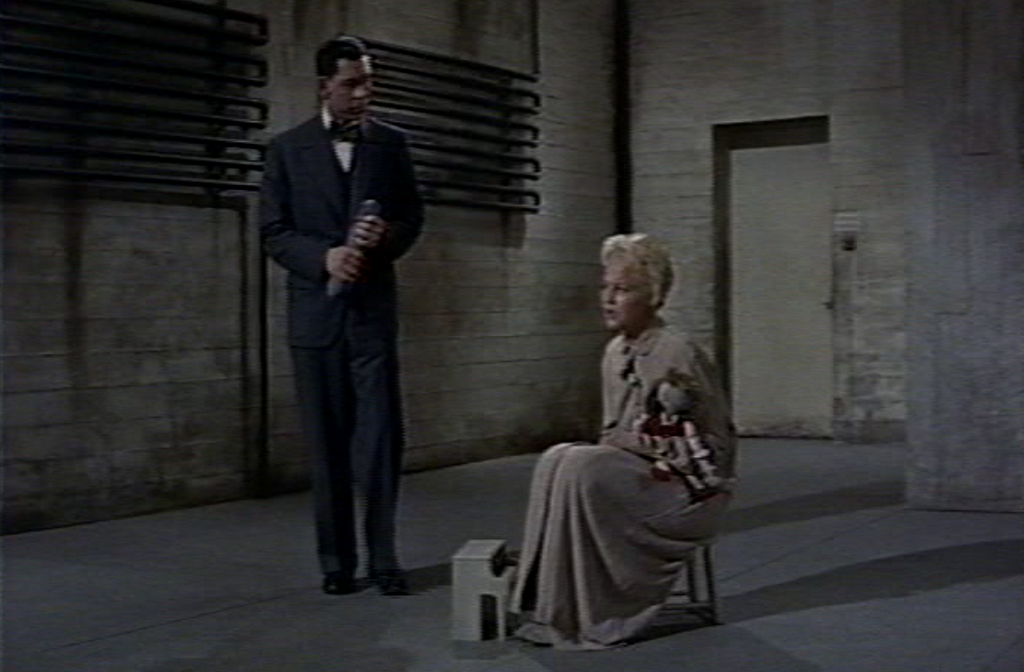 Rose is in the state mental institution "with the brain of a five year old," having experienced either a psychotic break or permanent brain damage as a result of McCarg's repeated beatings. Pete Kelly visits her, in the hopes that she might yet be able to provide a necessary clue to McCarg's misdeeds on a fateful night years earlier. Underscored by the tinkling sounds of a toy piano, Rose dithers and rambles about "her baby" - an improbably dredlocked rag doll she cradles in her arms. In this extended, incredibly bizarre scene, Lee registers abject insanity and absolute lucidity, openhearted hope and self-protecting fear, electrifying pain and benumbed despair, giddy girlishness and the weariness of age. But, once again, Webb botches it all: as a director, he flattens it in wide shot; as a scene partner, his obsequious banality blunts every one of Lee's moments. It's just astonishing to watch as Webb's every move tamps each of Lee's sparks.
Rose is in the state mental institution "with the brain of a five year old," having experienced either a psychotic break or permanent brain damage as a result of McCarg's repeated beatings. Pete Kelly visits her, in the hopes that she might yet be able to provide a necessary clue to McCarg's misdeeds on a fateful night years earlier. Underscored by the tinkling sounds of a toy piano, Rose dithers and rambles about "her baby" - an improbably dredlocked rag doll she cradles in her arms. In this extended, incredibly bizarre scene, Lee registers abject insanity and absolute lucidity, openhearted hope and self-protecting fear, electrifying pain and benumbed despair, giddy girlishness and the weariness of age. But, once again, Webb botches it all: as a director, he flattens it in wide shot; as a scene partner, his obsequious banality blunts every one of Lee's moments. It's just astonishing to watch as Webb's every move tamps each of Lee's sparks.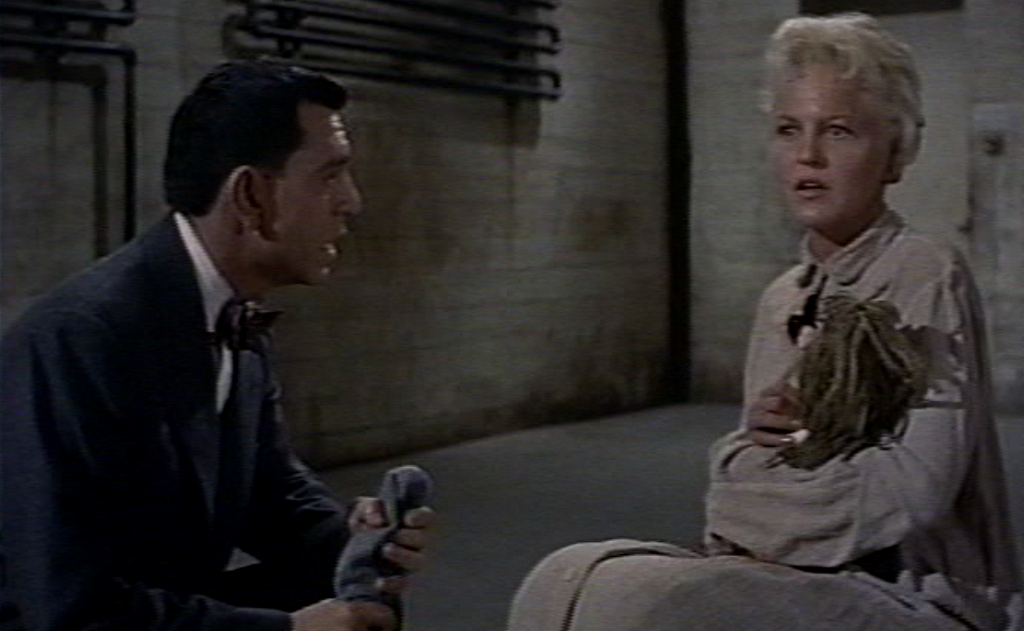 Nonetheless, something was happening in Peggy Lee's performance, something that the cruelties of pan-and-scan vhs transfer and/or the idiocy of Jack Webb's direction render almost illegible today. Something -- buried beneath the banality of this film. (Indeed, Lee's line reading of "he was mean to my baby" has haunted and chilled StinkyLulu's heart for weeks now.) Perhaps as a result, I find myself entertaining the fantasies of what Peggy Lee's performance might have looked like in the hands of a more intuitive, more demanding director -- what might have Lee's Rose looked like under the guidance of Altman, or Campion, or Haynes, or even Scorsese? It's a loss, truly...
Nonetheless, something was happening in Peggy Lee's performance, something that the cruelties of pan-and-scan vhs transfer and/or the idiocy of Jack Webb's direction render almost illegible today. Something -- buried beneath the banality of this film. (Indeed, Lee's line reading of "he was mean to my baby" has haunted and chilled StinkyLulu's heart for weeks now.) Perhaps as a result, I find myself entertaining the fantasies of what Peggy Lee's performance might have looked like in the hands of a more intuitive, more demanding director -- what might have Lee's Rose looked like under the guidance of Altman, or Campion, or Haynes, or even Scorsese? It's a loss, truly...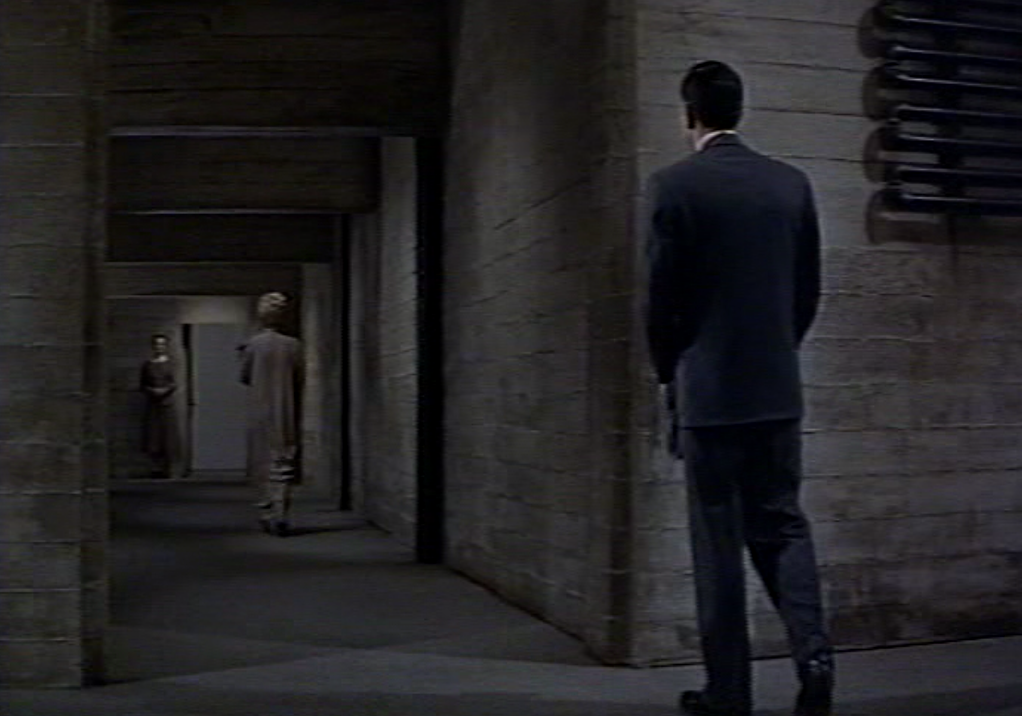 A possibly great performance nearly lost in this flat, boring mess of a film.
A possibly great performance nearly lost in this flat, boring mess of a film.
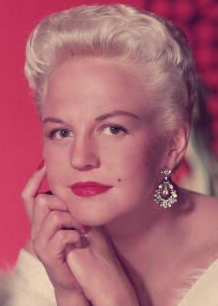
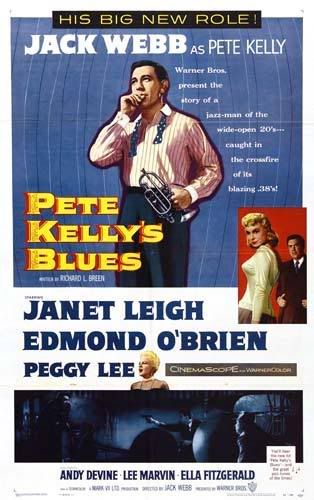
6 comments:
I've always loved the fact one of my favorite chanteuses was an Oscar nominee, even if I can't remember much about Pete Kelly's Blues. I believe Lee was considered a front-runner to actually win that year, and it would've been interesting to see how she may have progressed as an actress if she'd taken the prize, as I'm sure more roles would have been offered Lee with an Oscar to her credit.
There's a reason for the moaning over the accretive status, as the Oscar is awarded to (for example) Van Fleet in East of Eden, not to Van Fleet. This aspect of the Academy Awards was possibly best illustrated when George C. Scott refused his award for Patton, and the Academy retorted with something to the effect that the Oscar was for his work in the film, not just for Scott.
One nice aspect of the critics awards is how they sometimes honor several performances in a year by an actor, allowing the entire "body of work" to be listed. Very early on in the Acdemy's history, a performer could win for multiple works (Janet Gaynor and Emil Jannings were so honored the first year Academy Awards were handed out). I don't understand why this isn't allowed as, judging by their verbiage, the Academy is attempting to recoginize the top performances, not just performers, in a given category each year.
I think the frustration over the accretive noms/wins stems mostly from the general randomness of the Academy voters. It's a broad, opaque constituency and there's a recurrent disconnect between the Academy's official party line and the actual voting behavior of Academy voters.
Basically, the Academy doesn't want to be seen as a popularity contest but that doesn't stop Academy voters from using it as one.
But, whatever the case, it ain't really the nominees fault...
I was impressed by director Webb's dedication to achieving an authentic period look in "Pete Kelly's Blues". I think it went beyond, say, "Love Me or Leave Me" or "Singin' in the Rain". And certainly way beyond most 50's films set in the 20's (i.e. "Tea for Two"). Musically speaking, I'd say the band's instrumental pieces also sound pretty authentic However, it must be said that the vocals by Peggy Lee and Ella Fitzgerald (fine as they are) are pure 50's. And 20's audiences, hearing these cool,hip post-WW2 stylings would've thought they were listening to signals from Mars. Obviously, Webb made a deliberate decision here. I'm sure he was delighted to have the two music legends onboard. Electing to give 50's audiences the primetime Peggy and Ella they craved rather than dig up some more authentic but less accomplished stand-ins for Annette Hanshaw, Helen Kane or Bessie Smith. Certainly the inclusion of Peggy and Ella added a lot more commercial potential to the soundtrack Lp. Doris Day's singing was nothing like Ruth Etting's. Nor did Gogi Grant's style have much in common with Helen Morgan's. But they were voices that spoke eloquently to 50's audiences - and, even now, are no doubt more accessible to the average Joe than the rather more time-specific sounds of the women they portrayed.
P.S. I particularly love Janet Leigh's costumes in the film. And though her performance starts out poorly (definitely too gung-ho), Webb quickly relaxes her into a lovely portrayal. A real artistic progression for her at the time - and a curious, effective harbinger of her work in "The Manchurian Candidate".
You bring up a good point, Ken. I love the fifteis-ness of the singing in "I'll Cry tomorrow", and there are countless films where period was attempted, but not aurally--Funny Girl and Dramgirls (the most recent example) come to mind. Streisand is fabulous, but nothing like Fanny Brice (whose Second Hand Rose makes Streisand sound like she's from the Upper East Side), and nothing in the sixties or even early-mid seventies sounds like Beyonce doing Listen. Loved it, but not period. I usually key into ways that the period in costumes is belied in color choices, but it's more bald in sound--thanks for pointing that out.
I love that you found a copy of this. I've been trying for a while. <3
Peggy Lee Discography Release and info here: http://www.discoogle.com/wiki/Lee%2C_Peggy_Discography
Good Work!!!
Post a Comment